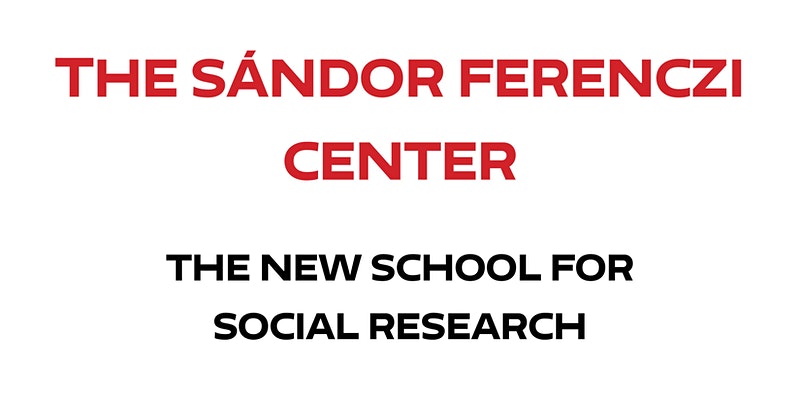Clinical Ferenczi: Exploring Ferenczi’s Clinical Legacy and its Applications to Contemporary Therapeutic Work with Anthony Bass, Ph.D. 2024/25

Presents
Clinical Ferenczi
Exploring Ferenczi’s Clinical Legacy and its Applications to Contemporary Therapeutic Work
A Clinical/Theory seminar with Anthony Bass, Ph.D.
CE Credits (16.5 hours) available for
New York Psychologists, Social Workers, and MHCs
APA CE credits available for Psychologists
Participants must attend all 10 seminar meetings in their entirety to receive CE credits.
This seminar will explore the clinical legacy of Sándor Ferenczi through readings of his work and the work of others who followed in the spirit of his findings on trauma; dissociation; mutuality; the uses of countertransference; and the intersubjective approach and sensibility. We will consider and explore clinical moments from an interpersonal/relational/intersubjective perspective that have been profoundly influenced by Ferenczi’s theories. Readings will include texts by Ferenczi, Balint, E. Severn, Frankel, Rudnytsky, Harris, Mitchell, Bromberg, Ghent, Stern, Aron, Black, Davies, Benjamin, Slochower, and Bass, among others. We will consider Ferenczi and others’ contributions to the development of theory and technique in light of challenging clinical moments that seminar members and the seminar leader will present.
This series is an extension of a previous seminar, “Reading the Clinical Diary and Other Works,” at the Sándor Ferenczi Center. New members of the group are welcome, with the understanding that those who join should be familiar with The Clinical Diary of Sándor Ferenczi and his groundbreaking paper, “The Confusion of Tongues Between Adults and the Child – The Language of Tenderness and of Passion,” as points of departure for our clinical and theoretical discussions.
* * *
Learning Objectives
At the end of the workshop, participants will be able to:
- List the ways in which Ferenczi’s late work has exercised a central role in the development of relational and intersubjective theory and technique of psychoanalysis.
- Identify Ferenczi’s influence on contemporary views of dissociation and multiplicity.
- Describe how Ferenczi’s work contributed to an understanding of the therapeutic relationship from a relational point of view.
- Discuss the impact of Ferenczi’s work on our understanding of unconscious communication and its relevance to psychoanalytic technique.
- Describe how Ferenczi’s work contributed to our understanding of the role of self-disclosure in psychoanalytic technique.
- Compare differences between self-disclosure, self-revelation and state sharing in psychoanalytic therapy, and the different uses of them in the clinical encounter.
- Explain why state-sharing is useful in a dissociative model of the mind.
- Describe the ways in which aspects of Ferenczi’s findings regarding mutual analysis are relevant to contemporary applications of intersubjectivity theories.
- Explain the ways in which Bromberg’s self state theory and multiple self state model is used clinically in contemporary work.
- Assess the ways in which enactment can be used therapeutically in relational analytic work.
- Explain the meaning of Balint’s concept of the “basic fault” and its relevance to clinical practice.
- Describe what Ferenczi meant by a dialogue of unconsciouses and its relevance to the “uncanny.”
- Describe the difference between “submission” and “surrender” in Ghent’s work on Masochism.
- Explain the difference between implicit and expressive uses of countertransference in Bollas’ work.
Participants who wish to receive CE credits must attend each seminar session in its entirety. Attendance will be recorded to track each participant’s entry and exit time.
Anthony Bass, Ph.D. is an associate professor and clinical consultant for the NYU Postdoctoral Program in Psychoanalysis and Psychotherapy and is on the faculty and a training and supervising analyst at the Columbia University Center for Psychoanalytic Training and Research. He was a founding editor, and, for 12 years, the editor-in-chief of Psychoanalytic Dialogues, where he continues to serve as editor emeritus. He was a founding director of IARPP and the Stephen Mitchell Relational Study Center, where he now serves as President. He is on the Board of Directors of the Sándor Ferenczi Center at The New School for Social Research. He is in practice for psychoanalysis, couples therapy, and clinical supervisory consultation in New York City and leads clinical seminars and workshops on the therapy relationship and Ferenczi studies around the world.
Participants with physical or sensory disabilities are encouraged to contact the CE committee members at least 2 weeks in advance of the event to plan for appropriate accommodations. Please contact us via phone or email:
Nichelle Horlacher, Department Secretary: T 212.229.5727 x3223
Miriam Steele, Ph.D. steelem@newschool.edu
Howard Steele, Ph.D. steeleh@newschool.edu
Netta Keesom, MA, Student Coordinator. NSSRFerencziCenter@gmail.com
Participants may also contact CE committee members with any concerns. You may also share concerns when you receive your evaluation form after the event.
Tickets may be refunded up to 24 hours prior to the start of the event.
Please email NSSRFerencziCenter@gmail.com to cancel your ticket and request a refund.
The New School for Social Research, Department of Psychology SW CPE is recognized by the New York State Education Department’s State Board for Social Work as an approved provider of continuing education for licensed social workers #0199.
The New School for Social Research, Department of Psychology is recognized by the New York State Education Department’s State Board for Mental Health Practitioners as an approved provider of continuing education for licensed mental health counselors. #MHC-0120.
The New School of Social Research, Department of Psychology is recognized by the New York State Education Department’s State Board for Psychology as an approved provider of continuing education for licensed psychologists #PSY-0146.
The New School for Social Research, Department of Psychology is approved by the American Psychological Association to sponsor continuing education for psychologists.
The New School for Social Research Clinical Psychology Department maintains responsibility for this program and its content.
The sponsors of this event report no conflicts of interest or commercial support.